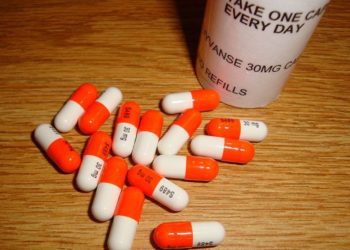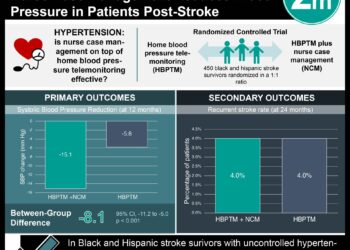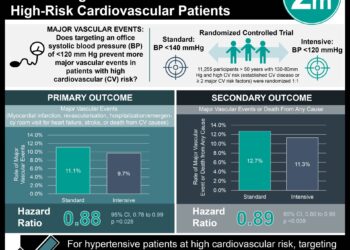The MDRD trial: Protein intake and blood pressure control in renal insufficiency [Classics Series]
1. Reducing protein intake and lower blood pressure targets did not significantly delay the rate of decline in GFR in patients with renal insufficiency
2. In patients with renal insufficiency and elevated baseline proteinuria (≥1 g/day in moderate insufficiency, ≥3 g/day in severe insufficiency), lower blood pressure targets significantly delayed the progression of renal disease
Original Date of Publication: March 31, 1994
Study Rundown: At the time of the Modification of Diet in Renal Disease (MDRD) trial in 1994, studies had shown that dietary protein restriction and blood pressure control delayed the progression of renal disease in animal models. The MDRD trial sought to assess whether dietary and blood pressure changes can similarly delay worsening renal insufficiency in humans. The study involved both patients with moderate (glomerular filtration rate or GFR between 25-55 mL/min/1.73m2) and severe renal insufficiency (GFR 13-24 mL/min/1.73m2), and randomized patients to different levels of protein intake and blood pressure control. At the 3 year mark, the rate of decline in GFR did not significantly differ between different degrees of protein consumption or blood pressure control. In subsets of patient with elevated baseline proteinuria (≥1 g/day in moderate insufficiency, ≥3 g/day in severe insufficiency), lower blood pressure control significantly slowed the progression of renal disease. A major limitation of the study was its low recruitment of minority patients, as 85% of study participants were white. The authors remarked that the study’s 53 black patients had a more rapid rate of GFR decline than the rest of the participants (p=0.02), suggesting that renal disease progression may differ for different patient populations.
In summary, the MDRD trial demonstrated that reducing protein intake and stricter blood pressure control do not significantly alter the rate of decline in GFR in patients with moderate or severe renal insufficiency.
Please click to read the study in NEJM
In-Depth [randomized, controlled study]: Originally published in 1994 in NEJM, this randomized trial was comprised of two studies involving 840 patients. The first study examined individuals with moderate renal insufficiency (GFR 25-55 mL/min/1.73m2), while the second involved those with severe insufficiency (GFR 13-24 mL/min/1.73m2). Eligible patients were between 18-70 years old, had creatinine concentrations within defined limits (1.2-7.0 mg/dL or 106-619 μmol/L for women, 1.4-7.0 mg/dL or 124-619 μmol/L for men) or a creatinine clearance rate <70 mL/min/1.73m2 of body surface area, and a mean arterial pressure ≤125 mmHg. The exclusion criteria included pregnancy, being excessively under- or over-weight (i.e., <80% or >160% of standard body weight), having diabetes mellitus and requiring insulin therapy, urinary protein excretion rate >10 g/day, and a history of renal transplantation or other chronic medical conditions.
Patients with moderate renal insufficiency (GFR of 25-55 ml/min/1.73m2) were randomized to usual- (1.3 g/kg/day) or low-protein diet (0.58 g/kg/day), and usual- (<140/90 mmHg) or low-blood pressure control (<130/80 mmHg). Patients with severe renal insufficiency (GFR of 13-24 ml/min/1.73m2) were randomized to receive low- (0.58 g/kg/day) or very low-protein diet (0.28 g/kg/day), and usual- (<140/90) or low-blood pressure control (<130/80). GFR was measured at 2 and 4 months, and every 4 months thereafter as an indicator of renal disease progression. The primary endpoint was the rate of change in GFR.
In patients with moderate renal insufficiency, there was no significant difference in the rate of decline in GFR between the diet or blood pressure groups at the 3-year mark. In patients with severe renal insufficiency, the rate of GFR decline also did not differ significantly between the diet and blood-pressure groups at 3 years. Subgroup analyses were performed based on baseline proteinuria. Patients with moderate insufficiency and ≥1 g/day of proteinuria were found to have significantly slower rates of decline in GFR when they were managed to lower blood pressure targets. The rate of decline in GFR was also significantly slower in patients with severe insufficiency and baseline proteinuria ≥3 g/day when they lower blood pressure was targeted.
Image: PD
©2012-2014 2minutemedicine.com. All rights reserved. No works may be reproduced without expressed written consent from 2minutemedicine.com. Disclaimer: We present factual information directly from peer reviewed medical journals. No post should be construed as medical advice and is not intended as such by the authors, editors, staff or by 2minutemedicine.com. PLEASE SEE A HEALTHCARE PROVIDER IN YOUR AREA IF YOU SEEK MEDICAL ADVICE OF ANY SORT.







